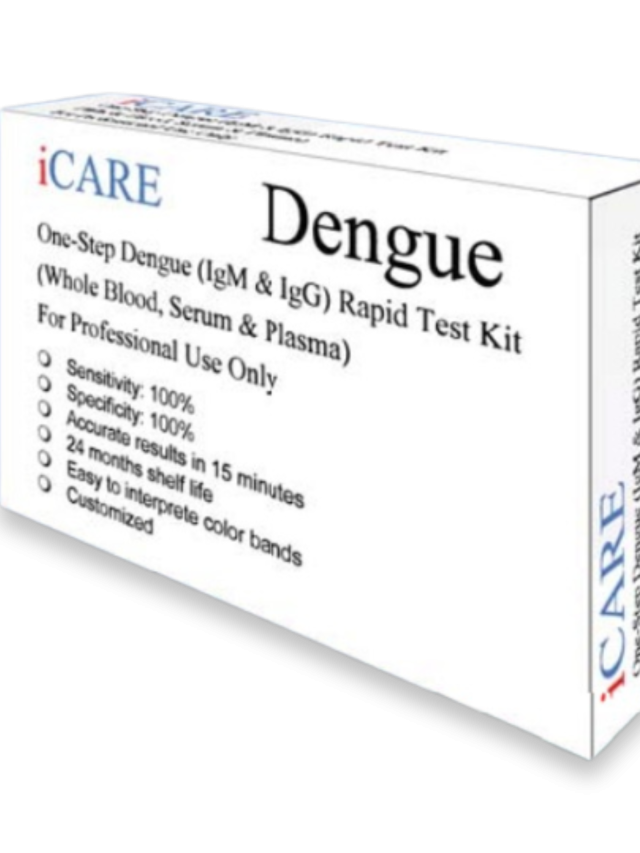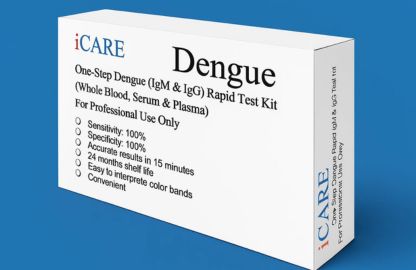Table of Contents
Objective:
This article outlines the best practices to effectively train healthcare workers in the correct handling, interpretation and implementation of the iCARE dengue test kits. Emphasis is placed on ensuring accurate diagnosis using dengue rapid tests such as the dengue IgM rapid test, dengue IgG IgM rapid test and dengue antigen test. Proper training supports early detection, case management and helps limit dengue outbreaks.

Why is Proper Training for iCARE Dengue Test Kits Essential?
Proper training ensures that healthcare workers can utilize the iCARE dengue rapid test kit correctly and consistently. These test kits are critical tools in detecting dengue virus antigens (Ag), antibodies (IgM and IgG) or a combination of both in suspected dengue cases. Misuse or mishandling may lead to false results, delayed diagnosis or poor case management, which can compromise public health.
Healthcare professionals may encounter various scenarios in the field – ranging from early-stage infections to secondary dengue infections – requiring specific knowledge of the diagnostic approach. Dengue combo test kits are specifically designed for these circumstances. However, without proper interpretation training, even high-quality diagnostic tools may not yield their intended benefits.
Moreover, understanding the difference between a dengue antigen test and a dengue IgM test kit is crucial. Healthcare workers must know when to apply the appropriate diagnostic based on the patient’s symptoms and the time of illness onset. Regular, structured training reduces error rates and increases testing confidence.
What Are the Core Training Objectives of Dengue Rapid Test Kits for Healthcare Workers?
To ensure efficient and safe usage of the iCARE dengue rapid test kit, core training objectives must be outlined clearly. These may include:
- Familiarization with kit components: Each dengue rapid diagnostic test kit may include test cassettes, buffer solutions, droppers and instruction manuals. Workers must recognize and understand each item’s function.
- Sample collection techniques: Training should cover proper methods to collect whole blood, serum or plasma as per the test kit’s instructions.
- Test procedure execution: Emphasis on timing, sample volume and buffer application is crucial. Simple errors like overuse of buffer or misplacing the sample can distort results.
- Result interpretation: Workers must accurately read test results within the designated time frame. This includes identifying control and test lines for positive, negative or invalid outcomes in a dengue IgM IgG test.
- Waste management and biosafety: Safe disposal of used kits and sharps minimizes exposure risks and environmental contamination.
Each of these objectives serves to improve the reliability of dengue rapid tests and streamline the diagnostic process in clinical or field settings.
How Should Dengue Fever Test Kits Training Be Structured for Maximum Impact?
Effective training on iCARE dengue test kits should follow a modular and hands-on approach. A structured program may include:
- Theoretical Orientation: Begin with sessions explaining dengue transmission, symptoms and diagnostic importance. Cover why early testing with a dengue fever test kit is vital in outbreak containment.
- Live Demonstrations: A trained facilitator may perform a live demonstration of how to use a dengue Ag test, dengue IgM rapid test and combo kits. Live visuals help in understanding test sensitivity and specificity.
- Interactive Workshops: Encourage participants to practice under supervision. This real-time engagement allows immediate correction and clarification, improving retention.
- Scenario-Based Training: Use patient case studies to simulate real diagnostic situations. For example, a patient presenting symptoms within 1-3 days may require a dengue antigen test, while another showing signs at day 6 may need a dengue IgG IgM rapid test.
- Visual Aids & Manuals: Charts showing common result interpretations, timing errors or common mistakes should be used. Training aids such as laminated instruction sheets or video tutorials also reinforce learning.
- Feedback Mechanism: Regular feedback and Q&A sessions help resolve uncertainties and boost confidence in using the dengue fever rapid test in diverse settings.
Training should be repeated periodically, especially when updates are made to the dengue rapid diagnostic test kits or new kits like the dengue duo test kit are introduced.
What Are the Common Challenges in Training for Dengue Rapid Test Kits?
Despite the structured modules, several challenges may arise during healthcare worker training:
- Language barriers: Instructional materials must be localized. Misinterpretation due to language can affect the correct use of dengue IgM test kits or dengue antigen tests.
- Varied educational backgrounds: Participants may have differing levels of scientific knowledge. Training must cater to a range of learning capabilities using simple explanations and hands-on demonstrations.
- Limited time and staff rotation: In high-burden facilities, there may be insufficient time for full-length training. Short, focused micro-sessions can help deliver key instructions efficiently.
- Lack of resources: Consistent access to training kits, updated dengue test kits and demonstration models is essential. A lack of supplies may compromise learning outcomes.
- Retention of information: Without regular practice, healthcare workers may forget procedures or confuse different rapid tests like the dengue IgM IgG test versus the dengue Ag test. Routine refresher training is essential.

Addressing these challenges with strategic planning and adaptive training tools enhances the workforce’s readiness for effective diagnosis using rapid test kit for dengue fever.
How Can Hands-On Practice Improve Test Kit Proficiency?
Practical, hands-on sessions are indispensable for reinforcing theoretical knowledge. While instructional manuals included in dengue test kits are helpful, tactile learning builds confidence and muscle memory.

During practice sessions, trainees may perform each step:
- Identifying the appropriate dengue fever test kit based on patient history.
- Performing test cassette preparation.
- Collecting and applying a sample correctly.
- Interpreting results within the recommended time frame (often 15-20 minutes for most iCARE dengue rapid test kits).
- Disposing of materials according to biomedical waste protocols.
Allowing learners to repeat these steps using various kits, such as the dengue combo test kit or the dengue IgG IgM rapid test, may enhance accuracy. Supervisors should observe and give feedback to fine-tune the process.
Consistent practice not only reduces error rates but also increases the worker’s ability to detect invalid results quickly, helping minimize delays in patient management.
How to Incorporate Dengue Combo Test Kits Ongoing Assessment in Training Programs?
Ongoing assessment is a key part of sustaining high-quality dengue test performance. This includes:
- Pre- and post-training assessments: These may include written quizzes, image-based interpretation tests or short oral exams to evaluate knowledge retention.
- On-site observation audits: Supervisors may occasionally observe staff during routine dengue rapid test use to assess adherence to protocols.
- Refresher courses: These can be offered quarterly or biannually, especially during dengue season peaks.
- Feedback surveys: Anonymous feedback forms allow trainees to express what worked and what needs improvement in the training program.
These methods help ensure that the use of dengue IgM test kits, antigen tests and combo kits stays aligned with best practices and evolving medical standards.

Conclusion
Training healthcare workers in the proper use of iCARE dengue test kits is not a one-time activity. It is a continuous, evolving process that may directly impact dengue outbreak control and patient outcomes. By implementing structured training, facilitating hands-on sessions and overcoming common challenges, healthcare professionals may be better equipped to deliver timely, accurate diagnoses using tools like the dengue Ag test.
As the landscape of rapid diagnostics continues to grow, so must our commitment to training the workforce that utilizes them. High-quality training ensures that the investment in dengue rapid test kits translates into real-world impact on patient care and public health.
FAQs About ICARE Dengue Rapid Test Kit
To ensure correct usage, accurate interpretation of results and consistent diagnostic performance, reducing false positives or negatives.
What is the purpose of training healthcare workers on iCARE dengue test kits?
To ensure correct usage, accurate interpretation of results and consistent diagnostic performance, reducing false positives or negatives.
How often should refresher training be conducted?
Refresher training may be conducted every 3 to 6 months, especially before and during peak dengue seasons.
Can iCARE dengue test kits be used in rural or resource-limited settings?
Yes, iCARE dengue rapid test kits are designed for ease of use and do not require complex equipment, making them suitable for such areas.
What should be included in a training session?
Training should cover kit components, sample collection, test execution, result interpretation, waste management and include hands-on practice.
What if a healthcare worker misinterprets a test result?
Supervisors or senior staff should review the result. If in doubt, re-testing with a new kit or laboratory confirmation may be necessary.






